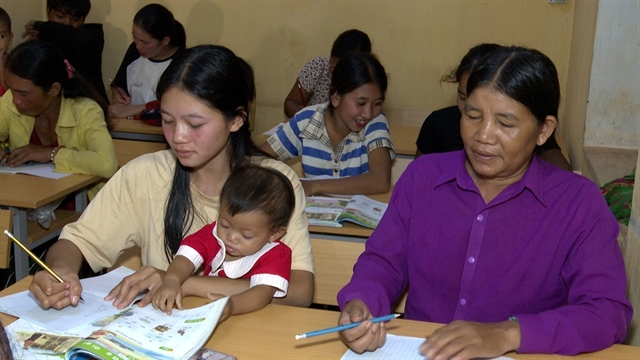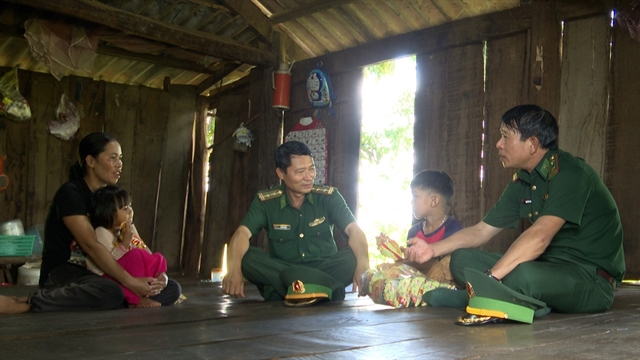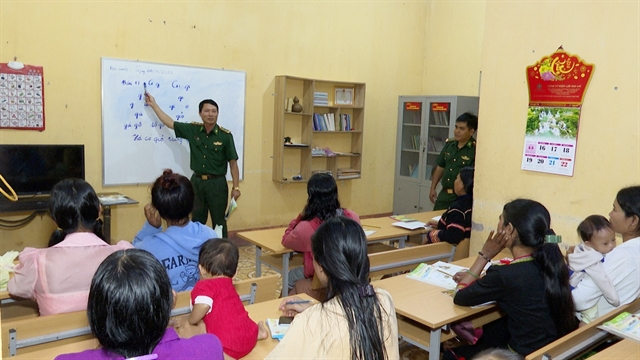 Society
Society


|
| Many JRai students have to bring their children to literacy classes. — VNA/VNS Photo |
GIA LAI — Border soldiers in the Tây Nguyên (Central Highlands) province of Gia Lai are assuming the role of teachers to eliminate illiteracy among local ethnic people.
The residential area of Suối Khôn in the border commune of Ia Mơ, Chu Prông District has 561 residents of the Jrai ethnic minority group, with most of them being very poor.
Currently, there are 71 illiterate people, accounting for 10 per cent of the area’s population.
Ia Lốp Border Guard Station opened classes to teach people and the soldiers are their teachers.
The classes not only help Jrai ethnic people in the village learn to read and write, but also contribute to raising people's awareness and responsibility in protecting the national borders.
To get to Suối Khôn Residential Area, it takes more than two hours to travel from the city of Pleiku to Ia Pier Commune, then through a dirt road of more than ten kilometres full of mud and slush.
Lieutenant Colonel Nguyễn Văn Thành, secretary of the station’s Party Committee, said that there were 71 Jrai ethnic people who were illiterate, of which 45 people wanted to learn.
The station’s leaders decided to open classes to teach the illiterate people.
Since earlier this year, Ia Lốp Border Guard Station has organised two four-month literacy classes for the Jrai ethnic minority with 25 students.
The teachers are soldiers including Lieutenant Colonel Vũ Văn Hoàng, who teaches math, and Captain Nguyễn Văn Luân, who teaches Vietnamese language.
The entire programme uses literacy learning materials compiled by the Ministry of Education and Training.
The classes, which take place three evenings per week, received the professional support of Hoàng Hoa Thám Primary School in neighbouring Ia Piơr Commune.
Captain Nguyễn Văn Luân said that the journey of mobilising people to come to class encountered many hardships.
“The weather conditions here are very harsh. People mainly work in agriculture and their lives are very difficult,” Luân said.
“Ethnic minorities often feel an inferiority complex and have low self-esteem so they are timid in communication,” Luân said.
“Therefore, we had to go to each household to mobilise and encourage them to boldly come to class,” the captain said.

|
| Soldiers cum teachers of Ia Lốp Border Guard Station come directly to local residents' houses to urge them to attend literacy classes. — VNA/VNS Photo |
Getting people to come to school was difficult, and maintaining class size was even more difficult.
Lieutenant Colonel Vũ Văn Hoàng said that the classes started in the evening, but in the afternoon the teachers had to go to each house to remind people of the class.
Because the students’ ages ranged from 16 to 60, organising classes and teaching methods must be flexible, especially during the crop season. Students have to work hard during the day so many of them cannot attend classes in the evening, said Hoàng.
“So to maintain the classes, the border guard soldiers had to come to help people with farm work or take care of their children to help them feel secure and focus on their studies,” said Hoàng.
Change of life
Kpui H’Lép, 27, is one of the outstanding students. After only four months of studying, she was able to read and write fluently.
H'Lep happily said: "Before, I was illiterate, very self-conscious and shy. I was always oppressed when doing business and criticised when doing housework.”
“But now it is different. I learned how to read and calculate. I thanked the teachers for helping me and other people in the village to have a better life," she said.
Another student, Rơ Lan H'Cúc, 26, residing in Sâm Village, Ia Piơr Commune, has a two-year-old daughter whom she has to carry to evening classes.
Rơ Lan H'Cúc often sits at the back of the class but is very diligent and serious.
“I regretted not being literate earlier. Now I have the opportunity to learn many things from teachers. The teachers not only taught us how to read and write but also gave us books, pens, babysitting and farming instructions,” Rơ Lan H’Cúc said.
“I am very grateful to the teachers,” she said.
Suối Khôn residential area was formed in 2003. Most of residents are the Jrai ethnic minority.
Since its formation until now, this residential area has not yet received basic investment in electricity, roads, and schools, and people haven’t fully benefited from social security policies.
The reason is because this land belongs to the administrative boundaries of Ia Mơ Commune but the population is managed by another commune, Ia Piơr Commune.
Hà Văn Tin, vice chairman of the People's Committee of Ia Piơr Commune, Chu Prông District, said that the authorities of Ia Piơr and Ia Mơ communes and the people in the area hoped that the competent authorities would soon allow the establishment of Khôl Village under Ia Mơ Commune according to a project since April 2022.
This is a condition for Suối Khôn Residential Area to be better managed and develop in the future, Tin said. — VNS

|
| Soldiers of the Ia Lốp Border Guard Station teach literary classes for JRai ethnic minority people. — VNA/VNS Photo |




